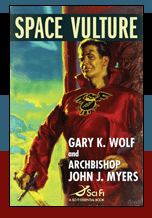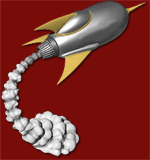It sounds like the setup for a joke: a Nebula-Award-winning author and the Roman Catholic Archbishop of Newark teaming up to write a pulp SF novel. Heck, it even sounds like the punchline. I was intrigued by Space Vulture as soon as I heard about it last fall, but I was wary-- after watching the first episode of the Sci Fi Channel's execrable (and now justly-canceled) Flash Gordon revamp, I was skeptical of pulp revivals. Add to that the fact that some of the publicity trades on the gimmicky nature of its authorship and you have quite a few reasons for low expectations.
I'm pleased to say that I needn't have worried. Space Vulture is a rollicking good time. I needn't really explain why-- the book's been reviewed by dozens of other sites by now, and the key word they all use to define Gary K. Wolf and Archbishop John J. Myers' take of ray guns and space slavers is "fun." The question on my mind was: does this novel show any signs of having been co-authored by an expert on canon law?
The answer is yes-- sort of. Myers has stated that he toned down some of the language, sex, and violence that Wolf wanted to inject into this pulp homage. (I was surprised to hear about any reduction in violence, seeing as the novel retains an abundance of flesh-eating aliens, severed limbs, and ray-gun headshots.) The general morality of the story seems guided by Myers' hand: there's a redeemed antihero here as well as the expected white-hatted space sheriff.
But there's a bigger religious story going on here, too, and it's tied in with another update to the pulp formula for which several reviewers have praised Wolf and Myers. You'd expect this kind of space opera to have a damsel in distress, and it does-- Cali Russell, a colonial administrator who is abducted by the villainous Space Vulture. But Cali is no bubbleheaded star princess; she's a complex and strong character who takes an active role in the story's drama. A big part of Cali's character is her religious faith. Early in the story we learn that she met her husband in church; later, in a moment of despair following her abduction, she prays. But-- and this is what's kind of revolutionary here-- that's it. Religion in SF is usually a bit more blatant; there are more monks than laypeople in SF, more messiahs than adherents. I've criticized Guy Stewart's argument that SF excludes religion as too short-sighted, but there's a kernel of truth in his claim that "Christianity disappears in space." There aren't too many just-plain-believers in SF-- or, if there are, they don't talk about it much. In Cali, a major work of SF has a character who is realistically religious without being wholly defined by her religion. We don't learn much about her faith, but we don't need to; it's just a single facet of a well-drawn character.
None of which is to say that Space Vulture is an intellectual powerhouse or a genre-changing work, and it's not intended to be. It's a deliberate throwback to an era where most SF didn't try to have thematic depth. But Myers and Wolf wrote this book after being disappointed to re-read some of their favorite space operas and find they didn't hold up. They hoped to make Space Vulture a more satisfying approach to the tropes of the '40s. It's nice to see that religious depth is one aspect of that re-imagining.
--by Gabriel McKee, author of The Gospel According to Science Fiction


